“He’s on a learning curve, no doubt about it. He’s still going through a learning curve, but that’s natural. He’s a sharp young man. If there’s anything wrong, he’s overenthusiastic about things once in a while, and you just have to rein him in. That’s youthful exuberance, and that’s the kind of stuff you want in people.”
— Lieutenant Governor Ron Ramsey, speaker of the Tennessee State Senate, March 20th
In the spring of 2005, newly elected state Representative Brian Kelsey, a 26-year-old Germantown Republican who had been in office a mere few weeks, decided to summon the Capitol Hill’s press corps to a press conference. This was a surprise to the denizens of Legislative Plaza, who had the same expectations of legislative newbies as did the veteran members of the Tennessee legislature themselves.
“Wait your turn.” “Bide your time.” “Respect the protocol.” Even some version of the old childhood standard, “Be seen and not heard.” All these were an understood part of the ritual for the newcomer in a body as dependent on established hierarchies as the General Assembly, particularly as it was constituted in spring 2005, when majority Democrats had the same solid grip on the levers of power that they had possessed since Reconstruction.
 Lauren Rae Holtermann
Lauren Rae Holtermann
Senator Brian Kelsey
All the aforesaid admonitions and one more crucial one — “Don’t make waves or rock the boat” — would have made perfect sense to the then recently retired Joe Kent, the genial ex-policeman who, for 26 years before Kelsey, had held the District 83 seat encasing portions of Southeast Memphis and Germantown. A moderate’s moderate, Kent had moved easily in a chamber long dominated by House Speaker Jimmy Naifeh, the Covington Democrat whose word was law and whose wielding of the gavel brooked no appeal.
So it was a double jolt for the Capitol Hill reporters when they assembled in a hearing room that day in early 2005 and realized that the tousle-haired, button-downed rookie legislator before them, who could easily have been taken for an intern, was there to lambaste the venerable speaker for abuse of power, in general, and in particular, for a procedural ruling that, as Kelsey saw it, skewed the results of a voice vote so as to interpret a clear chorus of nays as so many ayes.
But the surprise of the press gang was nothing compared to the astonishment of Naifeh himself, who later that week boarded a Capitol elevator in the company of then state Representative Paul Stanley, also a Germantown Republican, but a more senior one who at the time held one of his party’s leadership posts.
“Who is this whippersnapper?” might be a polite and somewhat Bowdlerized version of the question Naifeh asked Stanley, who executed some version of a shoulder shrug to indicate that he himself had no answer.
“And he [Naifeh] didn’t speak to me after that for three years, which made it dfficult,” Kelsey says now, with the kind of self-effacing grin that is part sheepish and part proud of himself. And the freshman member would get disapproving vibes from both sides of the aisle. “You don’t send press releases blasting the speaker? I must say I wasn’t aware of the protocol. But am I glad I was standing up for the people? Yes.”
In the next few years, Kelsey would keep on vexing the then ruling Democrats — and assorted members of his own Republican Party, as well. There was the occasion in 2007, when state government, so often used to being straitened, approached the end of its legislative year with a budget surplus, for a change. The Democratic leaders of both chambers hit upon the expedient of offering Assembly members a portion of the overrun to use in their districts for projects of their choice.
In the House, this came to $100,000 per district, and most members of both parties had little issue with accepting the funds, which were being called “community enhancement grants.”
Not Kelsey, who preferred to use the term “pet pork projects” for the ad hoc grants. “This is the worst spending proposal I have heard in my time in the legislature,” Kelsey, midway through his second term, said at the time. “The idea of having members march around their districts like Santa Claus handing out checks reeks of incumbency protection and of buying votes.”

Kelsey with the brass at the wine bill signing
Accordingly, he filled an envelope with bacon and made a show on the floor of the House by handing it back to an annoyed Speaker Naifeh as a token of his refusal to participate.
That outraged several members, among them Kelsey’s fellow Shelby County Republican, Curry Todd of Collierville, who had what he considered good uses for the money in his district. Todd angrily approached Kelsey, whom — in what may have seemed an understatement at the time — he accused of being a “grandstander.”
For a while, Kelsey was referred to by colleagues as “Baby Bacon,” which quickly yielded to a blogger’s coinage, “the Stunt-Baby of Germantown,” a moniker that held for some time and still turns up in published criticism of Kelsey.
Acknowledging his aberrant ways of that period, Kelsey notes today that he was in the minority party in the House back then — the Senate had already gone Republican and elected the first GOP speaker, Ron Ramsey; the House didn’t turn over for another two years. And he offers this explanation for his antics:
“When you’re in the minority and you’re faced with the other party’s egregiously bad conduct, all you can do is scream and yell; the only shot you’ve got is to create a spotlight.”
Those are the sentiments, too, of Lieutenant Governor and Speaker Ramsey, who made a point in 2013 of replacing maverick Tea Party Senator Mae Beavers of Mt. Juliet as Senate Judiciary chairman with the more reliable Kelsey, who was elected to his body in 2009 (ironically, in a special election to replace Stanley, whose involvement with an intern had led to a scandal and a forced departure).
“I think those were more minority stunts in the House, and he has matured a lot since then,” Ramsey told the Flyer. “So now, when you’re one of 33 [senators], and you’re in a majority with responsibilities, those aren’t the kind of things you do. And I think he understands that.”
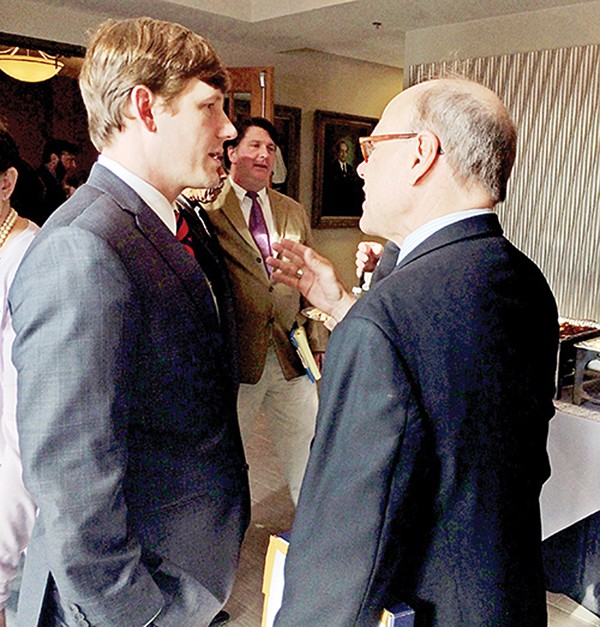
Senator Kelsey with U.S. Rep. Steve Cohen
Back then, however, the “spotlight” Kelsey spoke of would turn awkwardly on the young representative himself. In 2009, the Republicans fully expected to elect their own speaker to replace Naifeh. They had just eked out a one-vote majority in the House in the 2008 election cycle, and an East Tennessee Republican, Jason Mumpower, previously the House minority leader, considered himself sure to be the next speaker. He had already written his acceptance address.
The Democrats had other ideas, however, and they bargained with a friendly Republican, Kent Williams of Carter County, to accept the Speakership by adding his vote to theirs. In the uproar that followed this coup, no one professed more outrage than Kelsey, who lodged an ethics complaint against Williams for allegedly propositioning a female Republican member with the line “I will give a week’s pay just to see you naked.”
But Kelsey’s moral indignation took a setback when Williams made public a simultaneous email dispatched by Kelsey, who was a House Judiciary Committee member and hankered to be the committee chairman. The email, to one of Williams’ staffers, read, “Tell Kent I’m willing to talk about reconciliation if he’s willing to talk about chairman of the full committee.”
Kelsey’s explanation today: “I attempted to reach out to the new speaker, knowing full well it [the request for the committee chairmanship] would be rejected, and it was rejected. This was before the committee assignments were made. I thought I should make an effort to reach out to him.”
The leaked email incident was not the only embarrassment for the upwardly mobile young legislator.
On two occasions in 2009, his last year in the House, he was called out in news accounts for claiming undue credit for legislative acts — once in the case of a bill to expand charter schools in Tennessee, another time in the case of the Memphis City Council’s easing of residency requirements for police officers.
In the latter case, though, Kelsey had introduced a bill that would have caused Memphis to forfeit revenue from property confiscations unless its residency requirements were eased, and at least one councilmember, Shea Flinn, thought the representative’s action might indeed have influenced the council’s actions.
In any case, skepticism by others often attended the actions of Representative Brian Kelsey. (It still can: Wags in the press corps raised eyebrows at Kelsey’s unexpected presence on a stage for the recent wine-in-grocery-stores bill signing.)
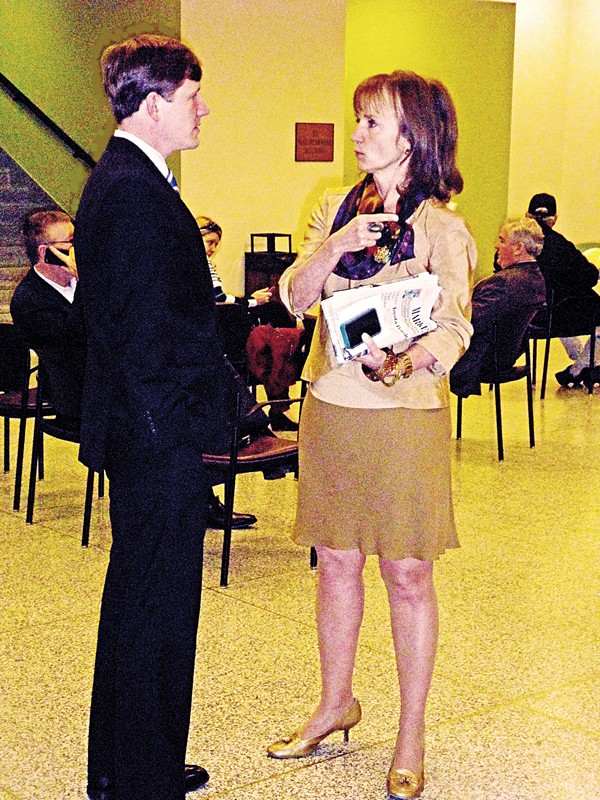
Senator Kelsey with House Speaker Beth Harwell
As a result of what would see some sort of legislative alchemy, however, his elevation to the Senate in late 2009 has profoundly altered the gravitas and influence claimed by Senator Brian Kelsey.
AS OF SPRING 2014, Kelsey, now 36 and a fixture in the GOP’s legislative super-majority, can claim a plethora of legislative accomplishments that are either celebrated or deplored, depending on one’s politics, but that have to be acknowledged in any case.
*Two of the three constitutional amendments on the statewide ballot this November were authored by Kelsey and nudged through the General Assembly by his perseverance.
One would abolish for all time the possibility of a state income tax of the sort that preoccupied and convulsed state government in the early years of this century.
Another, called by Kelsey the “Founding Father-Plus” amendment, would require the appointment of state appellate judges to be made by the governor and ratified by both chambers of the General Assembly. The amendment would eliminate all variants of the current judicial nominating commission.
*Kelsey has been the moving force behind efforts to prevent the statewide expansion of Medicaid (TennCare is Tennessee’s version), which is one of the linchpins of the Affordable Care Act (Obamacare) and which the state’s Hospital Association and Chamber of Commerce, among other institutions, have considered vital.
Kelsey sees Medicaid expansion as both a federal intrusion and ultimately as a financial burden the state cannot afford, although the federal government would pay the full expense of expansion for the first three years and would commit to paying 90 percent of costs thereafter. (Kelsey, like other conservative opponents of expansion, professes to doubt that commitment.)
*As the author of a bill for what he calls “opportunity scholarships,” Kelsey has been one of the prime forces behind a state voucher program for use in private schools. Though the senator insists that he favors vouchers only for low-income students in certifiably failing schools, critics fear that such a program would ultimately lead to the dissolution of borders between public and private, and between church and state, and would adulterate public education.
Kelsey’s insistence on a more ambitious voucher program than the one proposed by Governor Bill Haslam in the legislative session of 2013 ultimately forced the governor to withdraw the core bill he had offered. But, as Kelsey notes, a compromise measure that is due to be acted on before the end of the current session has already doubled the number of start-up vouchers from Haslam’s original 5,000 to 10,000.
*Kelsey is the sponsor or co-sponsor of numerous other measures that are part and parcel of Tennessee government’s new orientation toward conservative Republicanism.
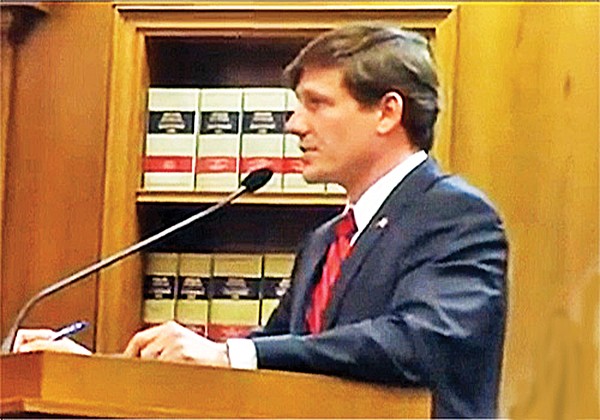
Senator Kelsey taking on Medicaid expansion
They include: a resolution putting Tennessee government on record as seeking a constitutional convention to impose a balanced budget; bills to rein in or eliminate various traditional forms of taxation, ranging from the Hall income tax on dividends to the gift tax to the inheritance tax to the state beer tax; bills to transform public pensions into 401k “planned contribution” systems; bills to shift workers’ compensation cases from the courts into a state administrative structure and to cap awards in personal injury cases; and bills to prohibit minimum-wage and living-wage legislation at local governmental levels that might clash with such mandates as are imposed by state law.
Kelsey proclaims himself an unabashed supporter of the state’s authority over local government on a host of issues, including pending legislation to allow charter school applicants to leap-frog over local school boards and be authorized directly by the state board of education.
And on the morning after the former Memphis City Schools (MCS) board voted to surrender its charter in December 2010, thereby forcing merger with Shelby County Schools, Kelsey put a bill in the legislative hopper that would have transferred to state authority the schools of the MCS — all the old MCS schools — if, as would happen, Memphis voters approved the surrender.
The Norris-Todd bill that would eventually enable breakaway municipal school districts in the suburbs superseded that bill.
“To the extent that local governments are infringing on the rights of citizens, it is absolutely the duty of the state to protect freedom,” Kelsey insists. “Cities and counties did not fend off the British. It was the states that banded together under the Constitution.” In Kelsey’s view, cities and counties are mere subdivisions of the state and “can be created and abolished and legislated over” as the state decides.
KELSEY, A PROBATE LAWYER in civil life, is a scion of two of the most prominent families in Collierville history, the Kelseys and the Carringtons. The fact that his mother was a public-school teacher enabled him, as he remembers it, to attend Memphis University School on scholarship via a cooperative inter-school arrangement not unlike what he wants to arrange statewide via his voucher legislation.
He graduated from the University of North Carolina and went to law school at Georgetown University, a haven, as he sees it now, for legal liberalism. He was somewhat shocked to be schooled by professors who acknowledged their Marxist roots, but he says he enjoyed the intellectual stimulation that came with such exposure.
Starting while he was still in law school, he went to work for a succession of Tennessee Republican eminences — Senator Fred Thompson, Congressman Ed Bryant (he and Bryant exited the Capitol together on the day of the 9/11 attacks), and Senator Bill Frist.
Kelsey left Frist’s office to work for a year in the White House of President George W. Bush as an intern (“mainly doing grunt work”) and was soon back in the Memphis area running for Representative Kent’s vacated position in 2004. “I was probably too young, but that seat had been held for 26 years, and I didn’t want to wait another 26 years for a crack at it.”
Through law school, his early governmental stints, and while in office, Kelsey has left himself little time for a personal life. His motto, one he repeats often in conversation, is: “Always be the most prepared person in the room.” He acknowledges there have been costs to that.
“While I was ahead in many ways in my professional career, I was behind in many ways in my personal life.” For one thing, he remains a bachelor. “I’ve never been engaged, never been close to being married. I thought being in Nashville would double my chances for finding the right person, but somehow it has cut my chances in half.”
But Kelsey soldiers on, attempting to stay the most prepared person in any room he’s in and seeing himself as a defender of the Constitution above all. He likes to cite his differences with the Tea Party wing of his party, embodied in his notable rebuttals, as Senate Judiciary chairman, of his predecessor in that position, Mae Beavers, who persists in introducing measures calling for nullification of federal law.
It had to be something of a personal setback, then, for Kelsey to see a bill of his own, which would have banned picketing in certain labor disputes, declared unconstitutional as an infringement on free speech just two weeks ago by state Attorney General Robert Cooper. (Kelsey’s personal website declares, among his desiderata, “I look forward to continuing to reform the judiciary … starting with how we pick the attorney general.”)
Another aborted effort was Kelsey’s sponsorship of SB2566, which was widely characterized as the “Turn Away the Gays” bill and which Kelsey withdrew after, as he puts it, “listening to my constituents.”
Though he says the bill was aimed only “to help pastors and rabbis and others to not be sued for not wanting to participate in a same-sex ceremony,” the bill was likened by critics to “model” legislation prepared by the right-wing American Legislative Exchange Council (ALEC) that would sanction the denial to gays of a wide array of commercial services.
Kelsey acknowledges that “discussions” at ALEC events have often been the inspiration for bills he has introduced, but contends that he gets most of his legislative ideas from the aforesaid “listening” to constituents
He regards himself primarily as a fiscal conservative and not a social conservative in the mold of Senate colleague Stacey Campfield (R-Knoxville). Hence, perhaps, a certain sensitivity that he evinces on the issue of the discarded SB2566.
But, lest anyone should get the idea that the erstwhile “stunt-baby” has transmogrified entirely into a stiff upper lip, Kelsey allows himself an occasional throwback moment. There was, for example, the occasion last fall when Health and Human Services Secretary Kathleen Sebelius came to Memphis on behalf of Obamacare, the online site for which was then experiencing start-up difficulties. She was accosted by Kelsey, who presented her with a copy of “Websites for Dummies.”
Kelsey says his intent was to generate support for his anti-Medicaid expansion bill. “It was a light-hearted moment, but it had a very serious point.”
Be assured: Whatever else he is, Brian Kelsey is, in every conceivable meaning of the term, very serious.
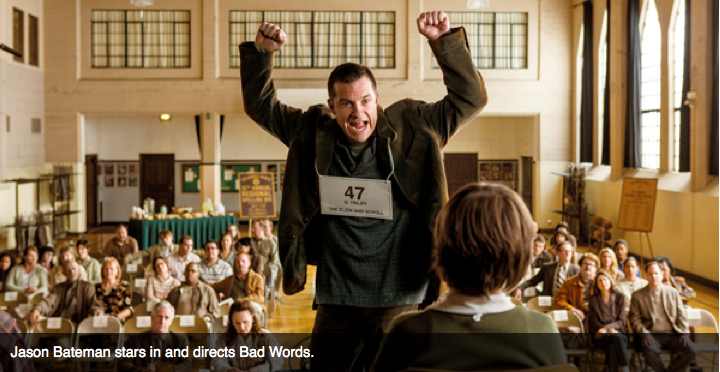


 Lauren Rae Holtermann
Lauren Rae Holtermann 



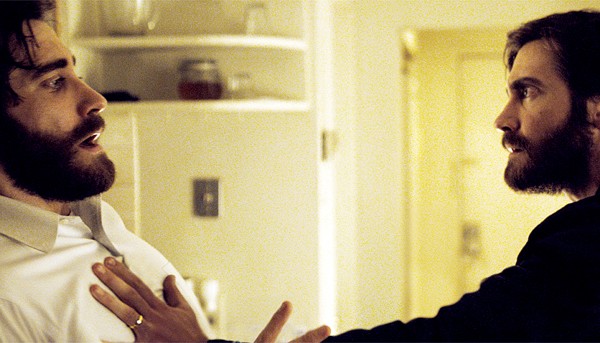
 Bianca Phillips
Bianca Phillips 
 Joey Miller
Joey Miller